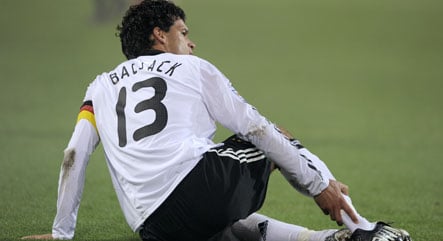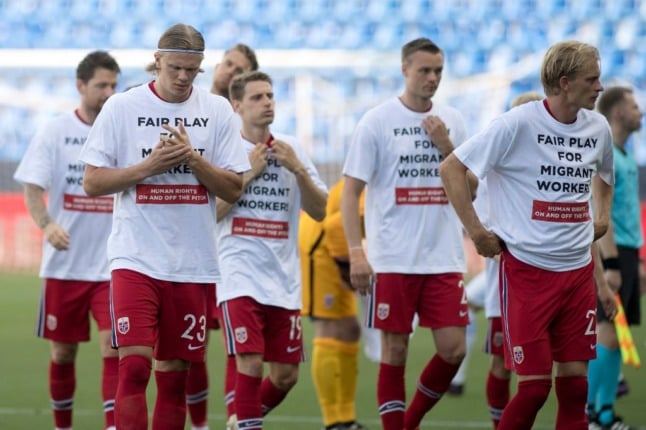Ballack scored a first-half goal in the 2-1 win over Russia in Dortmund on Saturday but damaged his left calf late in the game and missed training with the German squad in Düsseldorf on both Monday and Tuesday.
“Michael is in the hands of the team’s doctors and physios, we are monitoring his situation on an hour-by-hour basis,” said Germany team manager Oliver Bierhoff ahead of the game in Mönchengladbach. “He is one of our central figures and we are doing all we can to get him fit.”
Germany are top of Group Four with seven points while Wales are second in the group with six points from two wins and a defeat.
Defender Gareth Bale says underdogs Wales have nothing to lose as they look to topple Germany.
The Welsh struggled to a 2-0 win over Liechtenstein in Cardiff on Saturday which put them second in the group behind the Germans who defeated Russia 2-1 in Dortmund.
But Bale insists Wales can afford to throw caution to the wind and attack hosts Germany in Mönchengladbach.
“We’re going there looking for a result,” said Bale. “And there’s no reason why we can’t do that. There’s no pressure on us, we’re the underdogs and we just need to go out there and play our own football.”
Bale injured an ankle and missed the game when Wales drew 0-0 with Germany in Frankfurt 11 months ago in their final Euro 2008 qualifying match, but says the experience of earning a point away has boosted the Welsh. “Knowing we’ve enjoyed a positive result against them so recently will give us a lot of confidence,” he said.
And Bale’s Tottenham Hotspur team-mate Chris Gunter agreed Wales can leave Mönchengladbach with a point after losing 2-1 to Russia in Moscow last month. “If we are to qualify, we need to pick up points away from home,” Gunter told BBC Sport.
“We were unlucky in Russia, and there’s no reason why we can’t go to Germany and pick something up. We have no fear and are going there to get something.”
Germany showed weaknesses for John Toshack’s team to exploit against Russia in a Jekyll-and-Hyde performance.
The first-half goals by Ballack and Bayern Munich’s Lukas Podolski capped an impressive first 45 minutes dominated by the home side. But their defence creaked, especially down the right flank, as Russia attacked the home side in the second-half and only some good work from Germany goalkeeper Rene Adler, on his debut, prevented Russia from equalising.
Meanwhile Schalke 04 striker Kevin Kuranyi has been told by Germany coach Joachim Löw he will not be selected for his country again after walking out of the squad during Saturday’s win over Russia.
Welsh captain Craig Bellamy, who made his first start for Wales since October last year against Liechtenstein, is set to start as his country’s lone striker in a 4-5-1 formation.
Löw has said he expects his side to take another three points from Wales and a win would put them at least three points clear at the top of the table regardless of what happens when Russia play Finland the same night in Moscow.
“The Welsh play differently from the Russians, they are a typically British team who prevent goals being scored with hard work and a robust defence,” said Löw.



 Please whitelist us to continue reading.
Please whitelist us to continue reading.